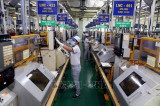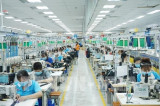Positive outlook for economic recovery in Southeast Asia
Southeast Asia has gained credence in the global economy since the onslaught of the COVID-19 pandemic and the Russia - Ukraine conflict, according to The Straits Times.

Ilustrative image (Photo: The Star)
More companies have moved their factories to the region, underscoring the region's relevance in the manufacturing supply chain, the newspapers said.
It noted that the closure of factories and seaports around the world after COVID-19 was declared a pandemic in March 2020 has led to chronic bottlenecks in global supply chains, even as many other countries have reopened their borders to resume business.
To avoid costly delays in production and logistics, a growing number of US semiconductor companies have moved their production facilities to and channelled new investments to Southeast Asia.
The newspaper cited some examples, like chipmaker GlobalFoundries which said in 2021 it would invest about 4 billion USD in a manufacturing facility in Singapore to meet rising global demand for semiconductor chips, or Intel Corporation which announced its plan to invest more than 7 billion USD in a chip testing and packaging plant in Penang, Malaysia. Foxconn technology company of Taiwan (China), which manufatures electronics for Apple, is building a 270-million-USD- factory to make laptops and tablets near Hanoi, Vietnam.
The Straits Times quoted Jajiv Biswas, chief economist at S&P Global Market Intelligence, as saying that Southeast Asia is an important part of the global manufacturing supply chain, especially for the electronics industry.
Due to supply chain disruptions and severe delays in supply times for key components in the global electronics industry during the pandemic, electronics companies are increasingly diversifying their supply chains to the region, he added.
Meanwhile, Moore Stephens, a senior advisor at professional services firm Moore Stephens, said countries in Southeast Asian are becoming key go-to-places in the global supply chain as businesses move away from China post-pandemic, adding that these developments strengthen Southeast Asia’s role in the global supply chain, and benefits locals.
For a short period earlier in 2022, growth projections for the region were looking promising.
According to the newspaper, June data from S&P Global Market Intelligence showed a solid overall expansion in the region’s manufacturing sector. It cited Biswas as saying that six out of the seven ASEAN member nations signalled growth in the month, with Singapore topping the rankings for the seventh consecutive month.
Biswas said Southeast Asian will still remain a key destination for foreign direct investment by multinationals from the US, the European Union and Northeast Asia./.
VNA
 Bulgaria charts new course with Vietnam on President’s upcoming visit: Diplomat
Bulgaria charts new course with Vietnam on President’s upcoming visit: Diplomat
 Seminar seeks ways to boost ASEAN - Latin America connectivity
Seminar seeks ways to boost ASEAN - Latin America connectivity
 Indonesia seeks India's help in health education
Indonesia seeks India's help in health education
 Indonesia named world's most generous country in 2024
Indonesia named world's most generous country in 2024
 Philippines: Over-4m-high floodwaters make thousands of houses submerged
Philippines: Over-4m-high floodwaters make thousands of houses submerged
 Singapore’s public sector records carbon reduction in 2023
Singapore’s public sector records carbon reduction in 2023
 Pressure facing the EU on its growth track
Pressure facing the EU on its growth track
 Efforts boosted to combat transnational organised crime
Efforts boosted to combat transnational organised crime
 Nearly 200 terror suspects arrested in Indonesia in two years
Nearly 200 terror suspects arrested in Indonesia in two years
 Vietravel launches tourism joint venture in India
Vietravel launches tourism joint venture in India



